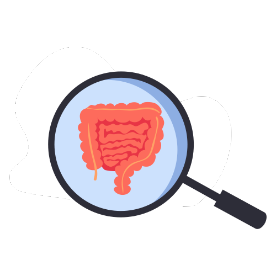All About Remission
Remission is the goal for many people living with IBD, but the journey to get there may not look the same for everyone. Read to learn more about pathways to remission.
Fistulas and Fissures
Navigating fistulas or fissures as a result of IBD can be challenging. Learn the signs and how to manage them.
TRACKING YOUR SYMPTOMS
If you are experiencing symptoms of inflammatory bowel disease, it is important to talk to your healthcare provider as soon as possible. Be sure to share all of your symptoms and how long you have been experiencing them. And don’t feel embarrassed—gastroenterologists work with IBD patients every day, and they are very familiar with all of the symptoms you may be experiencing. Many of the diagnostic protocols for Crohn’s disease or ulcerative colitis require this information, and it can take time to rule out other causes for your symptoms, so it’s important not to delay the conversation so you can move forward with next steps.
Check out the Crohn’s & Colitis Foundation’s IBD Symptom TrackerCHECKLIST FOR INSURANCE
Getting diagnosed with a chronic, lifelong disease like Crohn’s disease or ulcerative colitis can be overwhelming.
Check out the Crohn’s & Colitis Foundation’s IBD Insurance ChecklistFINDING THE RIGHT DOCTOR
There are a few ways to find the right gastroenterologist for you. You can ask your primary care doctor for a referral or visit your insurance website, which may include search functions in its online portal to search for providers that fall within your insurance coverage.
Check out the Crohn’s & Colitis Foundation’s medical expert search portal

Talking to your doctor
If you have any additional questions about your condition, reach out to your HCP or healthcare team.
GLOSSARY
Aminosalicylates
Aminosalicylates are compounds that reduce inflammation in the lining of the intestine.
Antibiotics
Antibiotics may be used to treat infections related to IBD or used post-surgery to prevent infection.
Biologic therapies
Biologics are genetically engineered medications made from living organisms. They work to interfere with the body’s inflammatory response by targeting specific proteins associated with IBD.
Colonoscopy
A colonoscopy is an exam used to detect changes or abnormalities in the large intestine (colon) and rectum. During a colonoscopy, a long, flexible tube is inserted into the rectum. A tiny video camera at the tip of the tube allows the doctor to view the inside of the entire colon.
Corticosteroids
Corticosteroids affect the body’s ability to create and sustain an inflammatory response.
Crohn’s disease
A chronic inflammatory disease of the gastrointestinal tract, commonly affecting the end of the small intestine (ileum).
Endoscopy
A procedure that allows the examination of the colon and rectum. It consists of a tube with a camera that is inserted through the anus.
Fissures
Tears in the lining of the anus, which can cause pain and bleeding, especially during bowel movements.
Fistula
Abnormal channel that forms between the intestine to another structure or between the intestine and the bladder, vagina, or skin.
Gastroenterologist
A gastroenterologist is a physician with dedicated training in the management of diseases of the gastrointestinal tract and liver.
Immune-mediated disease
A healthy immune system protects you from disease and infection by attacking germs that get into your body. Germs are foreign invaders, so your immune system recognizes and destroys them. However, if you have an immune-mediated disease, your immune system attacks the healthy cells of your organs and tissues by mistake. There are more than 80 types of immune-mediated diseases. They can affect almost any part of your body.
Immunomodulators
Immunomodulators work to suppress your immune response, which decreases inflammation.
Inflammation
Inflammation is part of the body’s defense mechanism and plays a role in the healing process. When the body detects an intruder, such as a germ, it launches a biological response to try to remove it. Sometimes, the body mistakenly perceives its own cells or tissues as harmful. This reaction can lead to immune-mediated diseases such as ulcerative colitis or Crohn’s disease.
Inflammatory Bowel Disease
Inflammatory bowel disease (IBD) is an umbrella term used to describe disorders that involve chronic inflammation of your digestive tract. Types of IBD include ulcerative colitis and Crohn’s disease. IBD is not the same thing as irritable bowel syndrome (IBS).
Ostomy
An umbrella term referring to an artificial opening in an organ of the body which causes a change in the way urine or stool exits the body, created during an operation such as a colostomy, ileostomy, gastrostomy, or stoma.
- Colostomy
A surgical operation in which a piece of the colon is diverted to an artificial opening in the abdominal wall to bypass a damaged part of the colon. - Ileostomy
A surgically created opening in the abdomen in which a piece of the ileum (lowest part of the small intestine) is brought outside the abdominal wall to create a stoma through which digested food passes into an external pouching system. There are temporary and permanent versions.
Sigmoidoscopy
Much like a colonoscopy, a sigmoidoscopy examines the lower colon and rectum by means of a flexible tube inserted through the anus. It differs from a colonoscopy in that it looks only specifically at the lower colon and rectum, not the entire large intestine.
Stoma
A stoma is an opening on the abdomen connected to the digestive system to allow waste (feces) to be diverted out of the body. It looks like a small, pinkish, circular piece of flesh that is sewn to the body. It may lie flat to the body or protrude out. Over the top of the stoma, patients wear a pouch, which can either be closed or have an opening at the bottom. Stomas have no nerve endings so there should be no pain from it once healed from surgery.
Stricture
An abnormal narrowing of a bodily passage, such as the colon due to chronic inflammation.
Ulcerative colitis
Ulcerative colitis is an inflammatory bowel disease (IBD) that causes inflammation and ulcers (sores) in the large intestine (colon) and rectum.
The content of this website is not intended to be taken as medical advice and should not replace the recommendations and advice of your healthcare provider.







